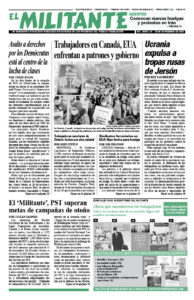The Ukrainian people inflicted another significant defeat onto Moscow’s attempt to conquer their country. Kyiv’s troops swept into Kherson Nov. 11, the only regional capital Moscow had taken since the war began, after the regime of President Vladimir Putin ordered the increasingly demoralized Russian forces to retreat.
Elated civilians who survived eight months of Moscow’s brutal occupation gave Ukrainian soldiers flowers and hoisted them on their shoulders. Billboards proclaiming “Russia is here forever!” were torn down.
“When our soldiers drove in, their machine guns were pointed up, into the air,” Serhiy Bloshko, a construction worker, told the New York Times. “When the Russians drove in, their guns were pointed at the people. That explains everything. And they said they were our liberators.” Bloshko had stayed at friends’ houses, fearing arrest after joining protests in March against Moscow’s occupation. Putin withdrew some 20,000 troops across the Dnipro River and further south.
Working people in Ukraine have been at the center of resistance to the invasion. Unlike Russian workers-in-uniform, used by Putin as cannon fodder, Ukrainian workers are fighting for a cause, deeply committed to defending their country’s independence. Their determination made possible the liberation of Kherson, coming after Moscow’s forces were repulsed from Kyiv in March, and routed from the Kharkiv region in September. It’s a humiliating loss for the Kremlin.
Russian soldiers had used live fire to drive protesters in Kherson off the streets in April. Putin claimed the region as Russian territory Sept. 30 after a sham referendum. But his forces never crushed resistance to Moscow’s rule.
Refusing to obey Moscow’s diktats, Olya Malyarchuk, a taxi company clerk in the city, wouldn’t settle bills in rubles and insisted on using Ukrainian currency. Iryna Dyagileva’s daughter attended a Kherson school where authorities demanded students memorize the Russian national anthem. Teachers ignored the order and greeted students each day with “Glory to Ukraine!”
Weeks before retreating, Russian soldiers carried away the bones of Prince Grigory Potemkin from the city’s cathedral. Potemkin led the czarist rulers’ colonization of southern Ukraine in the 18th century. “We don’t need the bones,” Father Vitaly, the cathedral’s priest, said. They’re “a symbol of Russia’s imperial ambitions.”
Before leaving, Russian forces destroyed power lines, water pipes and other infrastructure.
“Better without electricity, without water and without heat if also without the Russians,” Iryna Rodavanova, the retired curator of Kherson’s Art Museum, told the New York Times. Kyiv is trying to restore essential services and remove mines and unexploded munitions. Moscow responded to its latest defeat with a new round of drone and missile attacks aimed at depriving millions of Ukrainians of electricity, heat and running water, to try to break their morale.
Washington urges talks
The capitalist rulers in Washington and some European countries are pressuring the Ukrainian government to set up talks with Moscow and cede some territory seized by Putin’s forces, abandoning defense of the country’s sovereignty in the name of “peace.” These governments increasingly view the war as a threat to their own imperialist interests.
President Joseph Biden’s national security adviser, Jake Sullivan, advised Kyiv to leave aside “unrealistic” demands like regaining Crimea, which Moscow seized from Ukraine in 2014. Ukrainian President Volodymyr Zelensky responded that talks can resume, but only once Moscow returns all of Ukraine’s territory that it occupies.
Putin declared a conscription drive Sept. 21, sending tens of thousands of untrained and ill-equipped Russian troops to fight in Ukraine. This has fueled class conflicts inside Russia, prompting street protests in cities across the country in late September and other actions since then.
About 70 soldiers’ wives marched from Belgorod, Russia, across the Ukrainian border into the war zone in Luhansk. They confronted the Russian military brass about the treatment of their husbands, who had been involved in a battle in the Donetsk region where Russian forces suffered high casualties. “We don’t trust you anymore,” the soldiers’ wives told them. The women lodged a formal complaint with the military prosecutors’ office. “We will not give up,” Svetlana Gorbatenko told the press.
Other soldiers’ wives and relatives have protested the call-up in online videos. Elena Agaeva from Almetyevsk, Tatarstan, said the military is using her husband as “cannon fodder.”
Tatyana Vasilyeva, 26, from the Moscow region, said her husband found himself in the warzone with “no combat or shooting experience.” She said, “Today my husband and other men are in the forest without food, water, or warm clothes.” In Serov, hundreds of miles east of Moscow, a father said, “Our children are on the front line, treated like pigs.”
As the war continues, protests like these will mount.

